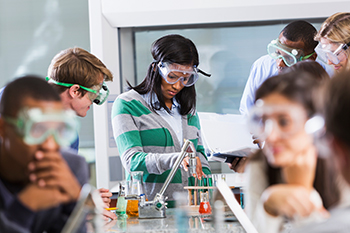Outcomes & Performance
The mission of the chemistry department at Lakeland is to provide a quality experience in chemical education by offering a variety of undergraduate and remedial chemistry courses that provide a solid foundation, emphasizing both theory and application, by pairing lecture and lab coursework. Low student-to-instructor ratios allow for greater individual attention for each student. The chemistry faculty are dedicated to upholding high academic standards and maintaining high quality, well-equipped labs where students receive individual instruction and carry out chemical experiments that involve 'hands-on' use of current technology and instrumental analysis.
Upon successful completion of coursework, students will:
- Metric System: Students will be able to apply knowledge of the metric system.
- Students will know common metric prefixes.
- Students will be able to make conversions between metric units.
- Atomic Structure: Students will demonstrate knowledge of atomic structure.
- Students will know the charge and location in an atom of the three main sub-atomic particles.
- Students will be able to write and interpret correct electron configurations.
- Chemical Formulas: Students will be able to write and interpret chemical formulas.
- Students will know element names and symbols.
- Students will know the symbol and charge of common monatomic and polyatomic ions.
- Students will be able to translate between the name and formula of molecular and ionic compounds.
- Stoichiometry: Students will be able to apply mole concepts to solve stoichiometry problems.
- Students will be able to use molar mass to convert between mass and moles.
- Students will be able to use Avogadro's number to calculate the number of particles (ions, atoms, molecules, etc.).
- Students will be able to balance chemical equations.
- Students will be able to determine the limiting reactant and theoretical yield in a stoichiometry problem.
- Aqueous Solutions: Students will demonstrate an understanding of aqueous solution concepts.
- Students will be able to calculate molarity.
- Students will be able to identify common acids and bases.
- Students will be able to calculate pH.
- Bonding: Students will demonstrate an understanding of chemical bonding concepts.
- Students will know the difference between ionic bonds versus covalent bonds.
- Students will be able to draw correct Lewis structures for ionic and covalent compounds.


